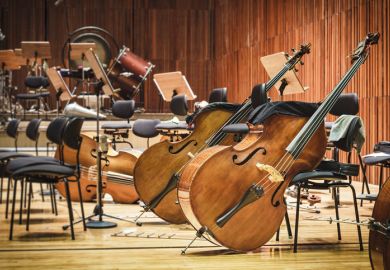Solomon Volkov begins his narrative of Shostakovich and Stalin with a discursive prologue in which he argues that Stalin modelled himself on Nicholas I, the tsar who personally intervened in Russian cultural life by appointing himself Pushkin's censor in the 1820s. Since Nicholas had a weakness for the poet's wife, Pushkin's dealings with the "gendarme of Europe" went far beyond literary scrutiny.
The "great composer" was profoundly affected by the policies of the "brutal dictator", who famously walked out of his opera Lady Macbeth of Mtsensk in 1936, but he met Stalin only once, during the selection of the new Soviet anthem in 1943. Their single other direct contact came in 1949, when Stalin made one of his legendary telephone calls to insist that Shostakovich become part of the Soviet delegation to the Congress for World Peace in New York. So the subtitle of this book is, in some respects, a misnomer. And although Shostakovich takes centre stage, it should be pointed out that a good many pages are devoted to Stalin's "relationships" with other prominent Soviet artists, including Pasternak, Gorky, Eisenstein and Akhmatova.
This is no bad thing. While the author does not add anything substantially new to our knowledge of Shostakovich (who emerges here as less of a victim than before), he draws on important new Russian publications about Soviet cultural politics in the 1930s. The result is a highly readable and wide-ranging account of the vicissitudes of artistic life in general under Stalin. This is perhaps the book's chief merit.
But there is a problem, as all who are familiar with the state of Shostakovich studies will be aware, and it is a serious one. At the height of the Cold War in 1979, three years after Volkov had emigrated to the US and four years after Shostakovich's death, Volkov published Testimony , a book purporting to be the composer's memoirs, "as related to and edited by" him. Most people in the West had identified Shostakovich with the Soviet regime (he had, after all, joined the Communist Party in 1960), so the embittered attack on Stalin contained in Testimony created a sensation. Despite the musicologist Laurel Fay's devastating review of the book, in which she revealed that the openings of seven of its eight chapters reproduced almost verbatim material that Shostakovich had published in his lifetime, there has been a continuing reluctance to view Testimony as anything other than wholly genuine. Scholars who have dared to suggest otherwise have been condemned as Communist lackeys and subjected to book-length vitriolic tirades. Volkov has, however, repeatedly ignored requests to submit his original Russian manuscript for inspection. He, rather than the Shostakovich estate, remains the sole copyright owner of Testimony , and also its financial beneficiary. It is not without relevance that following the publication of Volkov's Conversations with Brodsky (1998), the late poet's executors issued a statement categorically denying his participation or approval.
This, then, is the important background to Volkov's new book on Shostakovich, whose inconsistency with regard to the acknowledgement of sources certainly undermines its value as a work of scholarship. Volkov refers, for example, to "music scholars" who have deciphered the allusions to death and martyrdom in the famous finale of the fifth symphony, but elects not to acknowledge his debt to a key article by the Moscow musicologist Inna Barsova, despite discussing her findings. In other cases, journal issues or book titles are cited, but the names of authors or editors (such as the equally respected Lyudmila Kovnatskaya) are omitted.
A highly partisan book edited by people sympathetic to his cause, on the other hand, is cited in full. Volkov could learn a lot from the methods employed by Fay in the meticulous analysis she has made of his original typescript, having by chance finally gained access to a copy. She has now been able to prove beyond a shadow of doubt that Testimony was not the composer's consensual literary testament, and her scrupulously annotated article (included in the just-published Shostakovich Casebook , edited by Malcolm Brown), should be required reading alongside anything about Shostakovich published by Volkov.
Shostakovich and Stalin is, for the most part, fluently translated, but there are some infelicities, such as in the following passage:
"Shostakovich was a genius of orchestra, and when he composed he always heard the full score in his mind. The very process of orchestration was an inalienable part of composing rather than a tiresome chore - unlike Prokofiev, who often assigned his orchestral scores to an assistant." And it is a shame the author did not take greater care when proof-reading his footnotes; in one book title, Portret I. V. Stalina is rendered as Portret I. V. Stalilla .
Rosamund Bartlett is lecturer in Russian and music, Durham University.
Shostakovich and Stalin: The Extraordinary Relationship between the Great Composer and the Brutal Dictator
Author - Solomon Volkov
Publisher - Little, Brown
Pages - 370
Price - £14.99
ISBN - 0 316 86141 3
Register to continue
Why register?
- Registration is free and only takes a moment
- Once registered, you can read 3 articles a month
- Sign up for our newsletter
Subscribe
Or subscribe for unlimited access to:
- Unlimited access to news, views, insights & reviews
- Digital editions
- Digital access to THE’s university and college rankings analysis
Already registered or a current subscriber?



